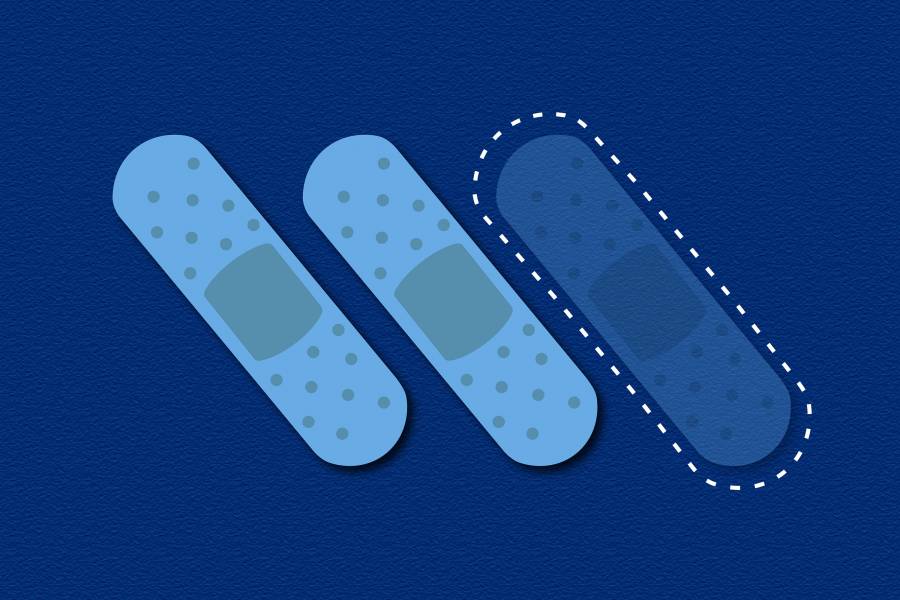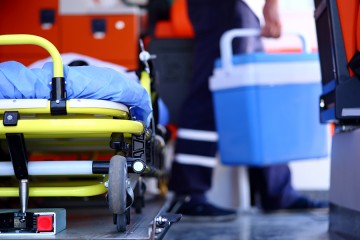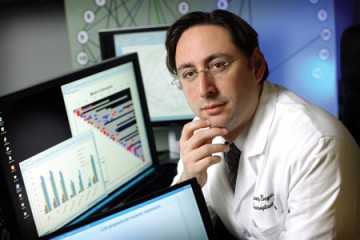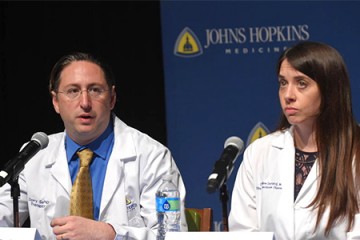Valen Keefer, a 38-year-old patient advocate in Auburn, California, remembers exactly how it felt when she got the call from a local pharmacy in early March: Two Moderna COVID-19 vaccine doses were available for her and her husband.
"We were just so excited and felt so emotional," Keefer says. "It reminded us of when we got the call for the transplant."
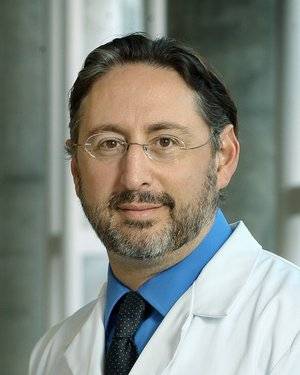
Image caption: Dorry Segev
Image credit: Johns Hopkins Medicine
The "call for the transplant" had occurred almost three years earlier, when Keefer learned that a liver was available to replace her failing one. It was her second transplant after having received a kidney 19 years ago. Keefer has polycystic kidney disease, a genetic condition that affects 600,000 people in the U.S. and is the fourth leading cause of kidney failure.
Coupled with her excitement about the doses, however, was a looming question: Would the vaccine work for her? Solid organ transplant recipients must take a cocktail of medications for life to ensure their bodies do not reject the new organ. These drugs work by suppressing the immune system's natural inclination to perceive the new organ as a threat and attack it. But that suppression can also hinder the immune system's ability to defend against viruses and other pathogens. COVID-19 vaccines work by introducing a protein from the SARS-CoV-2 virus into the body so that the immune system detects the threat and builds antibodies against it. If the immune system is so suppressed that it cannot respond, then the vaccine may offer that person less protection—or even none at all.
That question—whether the vaccine would protect transplant patients like Keefer and others with compromised immune systems—set Dorry Segev, director of the Epidemiology Research Group in Organ Transplantation at Johns Hopkins, onto a path of scientific inquiry that has produced more than three dozen papers since February on COVID-19 vaccination in immunocompromised people and resulted in a $40 million grant from the National Institutes of Health to study the effectiveness of giving kidney transplant recipients a third vaccine dose. The first part of the COVID-19 Protection After Transplant study also aims to learn which transplant patients can benefit from a third dose and which ones may need to take a different approach, such as temporarily reducing their transplant medication dosage before vaccination.
"On a patient level, we want to understand how we can optimize immune response and protection from the virus with the vaccine in immune-compromised people," Segev says.
From a research perspective, he hopes the study will reveal answers to the how and why: "Why are the immune responses so low, and in what way are they low? Are we missing something because we're only looking at antibodies? What's going on with the T-cells?" T-cells are immune cells that can kill infected cells or instruct other immune cells on what kind of antibodies to produce. Vaccines typically induce a T-cell response in addition to triggering production of antibodies, but the medications transplant recipients take explicitly suppress T-cell responses.
The answers to those questions, Segev says, will offer insights into the design of future vaccines, including those against potential coronavirus variants.
Segev has spent much of his career coming up with solutions to problems faced by people in the transplant community. Notably, he wrote the bill that made kidney exchanges legal in the U.S. The Norwood Act, passed in 2007, ensures that donors and recipients could swap kidneys in a four-way exchange without violating the prohibition of receiving or giving compensation for an organ. Six years later, Segev was the driving force behind the HIV Organ Policy Equity (HOPE) Act, which allows HIV-positive people to donate their organs to HIV-positive recipients.
"My drive is to find things in our field that could be drastically improved, and to do the kind of science that is required to fix them," Segev says. Or, more plainly, "My superpower is being pissed off by things that are actually fixable."
The first fixable problem Segev tackled as the pandemic began was the slowdown in transplant procedures occurring nationwide. He developed a protocol for determining whether the benefits outweighed the risks of moving forward with a transplant when the nation was on lockdown and nonemergency procedures were put on hold to conserve hospital resources. By the time the Food and Drug Administration authorized the first COVID-19 vaccine in December 2020, Segev and his colleagues had already turned their attention to the next potential challenge facing transplant patients.
"We knew in general that transplant recipients and other immunocompromised people are excluded from vaccine trials, and we knew that immunocompromised people don't necessarily respond as well to vaccines," says Brian Boyarsky, a postdoc and resident who Segev has mentored since Boyarsky graduated from John Hopkins as an undergraduate. "So, putting those things together and thinking about completely novel vaccines—mRNA vaccines have never really been used in humans before—nobody knew how transplant recipients would respond. The two major questions were, No. 1, are the vaccines safe for transplant recipients? And No. 2, how effective would the immune response to the vaccine be?"
Segev wasted no time in seeking the answers. Undeterred by obstacles that had disrupted or delayed other clinical trials, he and his colleagues recruited approximately 8,000 immune-compromised people through social media, clinics, and word of mouth. They sent and received blood collection devices through the mail and used remote interviewing and online questionnaires to track thousands of study participants across the country.
The team was nimble and creative, Segev says. "Rather than being hindered by 2021, we've leveraged 2021 to design the best possible study we could to get information" as fast as possible, he says. In a matter of weeks, his team began a national study that involved administering multiple questionnaires and collecting multiple blood samples from participants—without ever meeting any of them in person.
Less than two months after the authorization of the Pfizer-BioNTech vaccine, Segev had identified enough COVID-19–vaccinated transplant recipients to publish a letter in JAMA on their immune response to the first dose. Among 436 recipients, just 17% of them had any detectable antibodies against SARS-CoV-2.
"That was the warning light that transplant patients are not going to be protected," he says. They later published a study that found that just over half (54%) of recipients had any detectable antibodies after a second dose. "That was confirmation that there actually was a problem," Segev says.
Keefer was among the fortunate 17% who responded to the vaccine, though even those whose immune systems responded to the vaccine had lower antibody levels than what had been observed in the trials. Ginger Pillar, a 56-year-old OB nurse from Pittsburgh, who also has polycystic kidney disease, was not so lucky. She received the Pfizer vaccine in early February, exactly a year after receiving a donated kidney. Her father, who received a kidney 25 years ago, produced a strong antibody response after his COVID-19 vaccine, but Pillar and her sister, who had received a kidney just under five years ago, had no antibodies at all, in line with Segev's research findings that immune responses are less likely the more recent someone's transplant was.
Although not formally enrolled in Segev's study, Pillar had kept up with his research through webinars produced by his team. That's how she learned about the low response to both vaccine doses among transplant recipients and the fact that Segev's team would soon study whether a third dose helped. Since her work involved administering vaccines in a Pennsylvania health system, she brought the matter up with the physician who directed her clinic. After a bit of investigation, he decided they could give her a third shot in hopes it would offer her better protection. When Pillar notified Johns Hopkins of her third dose, they included her in a study of people who had procured third shots on their own. That study, the first to look at third doses in transplant recipients, showed that antibody levels increased in a third of participants with no previous antibodies and all of those with low levels after the initial two doses.
Shortly after that study's publication, France began recommending a third dose for all immune-compromised individuals—a policy that the French National Authority for Health announced the night before Boyarsky defended his doctoral dissertation on COVID-19 vaccination in the transplant population.
By then, other research teams had begun studying vaccination in immune-compromised populations, with several other third-dose studies quickly following Segev's. The emerging data led the FDA on Aug. 12 to authorize a third vaccine dose for immune-compromised populations.
The news thrilled Yolanda Tillett, a 57-year-old kidney transplant recipient who works in the Bloomberg School of Public Health's Office of External Affairs. About three weeks after she received her second Pfizer shot in late February, her son tested positive for COVID-19. Her symptoms began a few days later, confirming what she had feared—those two doses of the vaccine weren't enough to protect her.
Now, along with Keefer and Pillar, she's enrolled in Segev's study to see how she fares with a third dose, both for her own sake and for the sake of millions of other immune-compromised Americans hoping that vaccination is their ticket back to at least a partly normal life.
As someone who works in the Bloomberg School, "I understand the importance of the research that our faculty is doing for patients like me," Tillett says. "We kind of can't live in a cocoon for the rest of our lives. We've got this great gift of a kidney or an organ, and we want to get out and live."
Keefer agrees, noting that immune-compromised people have sometimes felt left behind during the pandemic. She says Segev's research helps the transplant community feel supported and heard, knowing someone is in their corner.
"My hope is that we can get as close as possible to integrate back into some type of normalcy because we deserve it just as much as everybody else," she says.
Pillar was disappointed when her third shot still didn't produce antibodies, but she remains optimistic that Segev's work, including research into pausing immune-suppressing medications to elicit a vaccine response, will eventually bear fruit.
"The more they study this, the more they get data, the more they will be able to come up with some solutions," Pillar says. This research, she says, "is not just protecting me, it's protecting a whole community of people that goes far beyond even the United States."
Though Keefer is fortunate to have already developed antibodies in response to the vaccine, her participation in the trial offers other benefits while she and her husband continue physical distancing.
"Being a part of this study, feeling like a part of the bigger picture, is very therapeutic, to not just be feeling alone in a really dark place," Keefer says. "So even though I'm very secluded with my husband, I don't feel alone because of being a part of something bigger."
Posted in Health+Well-Being
Tagged transplants, dorry segev, covid-19, covid-19 vaccine




